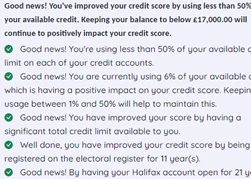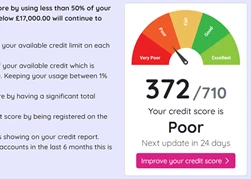Marriage & Money: Does Your Partner’s Credit Score Matter?

31st Aug 2025
Plans for the wedding, honeymoon, and beginning a new life together are often the topics of conversation when you are engaged to be married. But one important subject often gets avoided because it feels too personal or uncomfortable: credit scores.
Most individuals only know about their spouse's spending habits after they have already gotten married, and this can result in tension and conflict. It is only natural to ask: does your partner’s credit score matter when you are starting a life together? The response is more significant than many couples understand.
Why Credit Scores Matter in a Relationship?
A credit score is essentially a trust rating for your financial behaviour. It indicates the extent to which one has been able to manage credit previously and is likely to pay back future obligations in time. It determines if you are eligible for loans, mortgages, and some contracts, and what interest rates you qualify for. You don't necessarily combine credit scores when you marry, but your spouse's financial records can influence what is important to you both.
For instance, if you and your partner wish to take out a joint mortgage, lenders will consider both reports. A bad score on one can restrict the choices, increase interest rates, or even lead to rejection of the application. This is why it is advisable to discuss this early on.
Marriage Does Not Merge Your Credit Score
One of the popular myths is that getting married automatically merges credit reports. In fact, every individual's credit history is still independent. You both maintain separate credit scores and reports. But after you apply for joint credit like a loan, mortgage, or even a joint bank account, there is an economic connection between you. After this, lenders can view your spouse's credit report and consider it when making any decisions.
This is where the question of does your partner’s credit score matter comes into play. Although you are not technically exchanging scores, their spending habits may affect your ability to borrow.
How a Partner’s Credit Can Affect Your Plans
Your partner's credit report can affect your life together in a number of ways:
1. Obtaining a Mortgage
Most couples eventually hope to purchase a house. Mortgage lenders will review both applicants' credit backgrounds before giving the loan. If someone has bad credit, it may result in higher interest or more stringent terms. In a few instances, the lender might even reject a joint application outright.
2. Applying for Joint Loans
Whether it is a mortgage or home improvements, joint loans are commonly utilised between couples. Once more, a poor score on one side can restrict access to the most favorable rates.
3. Creating Household Accounts
Certain utility providers and mobile phone companies run credit checks before opening an account. If your partner has poor credit, you could be required to pay deposits or be placed on restrictions.
4. Renting a Property Together
Even landlords and letting agents check credit. If one partner has a poor score, it could result in needing a guarantor or paying more upfront.
Talking About Credit with Your Partner
Money talk can be awkward, particularly if a person is embarrassed about their credit past. That said, credit honesty is important to establish trust and plan successfully. Don’t approach it like an interrogation; instead, focus the conversation on shared goals.
Some advice for bringing up the subject:
· Make it a casual time when you both have time to chat.
· Discuss your own credit scenario first to set up the conversation as even.
· Pay attention to how you may cooperate to accomplish your aims.
· Don't use critical words. Recall that many people have experienced financial hardship at some point.
In order to both understand where you are starting from, it can be beneficial to check your credit score jointly. Transparency and teamwork are fostered by this.
Improving Credit as a Couple
If you find that the credit score of one partner is poor, it is not the end of the world. Scores can be improved with the right habits over time. Here are a few steps you can take together:
1. Pay Bills on Time
On-time payments are one of the largest contributors to having a strong score. One late payment can cause harm.
2. Cut Existing Debt
High credit use can depress scores. Reducing balances on charge cards and loans can provide a significant increase.
3. Don't Overdo Credit Applications
Each time you apply for credit, an inquiry (also called a hard search) is added to your report. Too many at once can make you appear to be risky.
4. Utilise Tools to Track Progress
Employing a free credit score checker will assist in monitoring improvement as well as maintaining motivation. It is also an effective method of early error detection.
5. Maintain Old Accounts
Your credit history length does matter. Closing old accounts may lower scores at times, so consider carefully before closing them.
When to Apply Separately?
If the credit score of your partner is much lower than yours, it may be worth applying for some credit products in only your name. For instance, if you are getting a mortgage, a single application could get a more favorable interest rate. Only one person would be involved, so you should carefully consider the financial and legal complications. In order to make the best choice for your case, it is advised that you obtain expert advice in such circumstances.
How to Check Credit Reports in the UK?
The three main credit reference companies in the UK Experian, Equifax, and TransUnion are able to provide you with your credit report. It is a good idea to examine all three because they can have slightly different information.
You can also check credit online through online services that aggregate data from these agencies. By checking your reports on a regular basis, you can see where you can improve and check there are no errors damaging your score.
Why Communication is Key?
At its core, the question does your partner’s credit score matter is more about how money and relationships blend. Money problems are one of the most common causes of conflict in marriages, but they are much less likely to be a problem if you are honest and proactive.
By getting to know each other's credit standing in advance, you will make better decisions regarding joint accounts, loans, and investments. You can also develop a strategy to raise scores if needed, instead of getting surprises later.
Final Thoughts:
Credit ratings are a major factor in your future together, but they are not the most romantic subject. Although your credit score won’t directly merge with your partner’s, their financial history can still influence shared financial decisions. Because of this, it is critical to plan ahead, have open discussions, and take action when necessary.
So, does your partner’s credit score matter? Yes. It is not only a matter of figures on a report, but of creating a foundation of trust, open communication, and financial security for your shared life. Couples who approach credit as a joint venture are more likely to weather problems, reach their goals, and bask in the future they're so diligently building.
Don't risk missing
something important
Access a comprehensive credit report
that includes detailed data from TransUnion
View your credit score for only £1.95.
You can view it for 1 month, after which it will be £14.95 per month unless cancelled.
See How You Score

See How You Score
An Independent View Of Your Credit Score
Lenders typically use their own systems to calculate your Credit Score based on the information in your Credit Report, often checking with one or more Credit Reference Agencies. Your Credit Check Online Credit Score is derived from all the Credit Report information we gather from TransUnion, helping you understand how you might be assessed when applying for credit.

Understand What is Affecting Your Credit Score
Quickly see how the details in your Credit Report influence your Credit Check Online Credit Score, both positively and negatively. This clear overview helps you identify areas for improvement and better understand the factors that lenders consider when assessing your creditworthiness.
View your credit score for only £1.95.
You can view it for 1 month, after which it will be £14.95 per month unless cancelled.